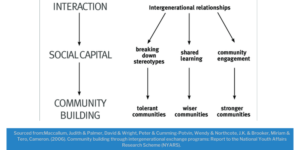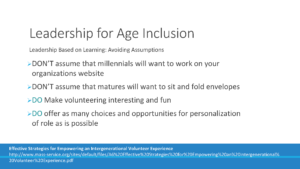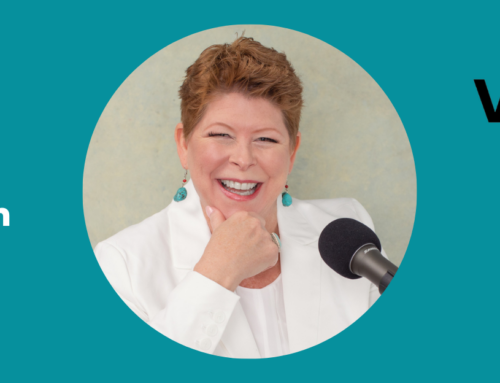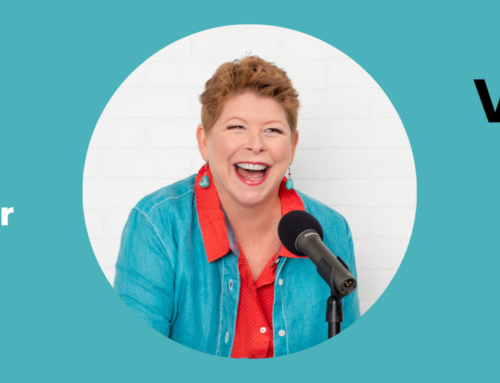The Power of Intergenerational Volunteer Programs to Build Strong Communities
In addition to satisfying the psychological needs of participants and achieving the goals of nonprofit organizations, there are benefits to the community at large from intergenerational volunteer programs.
Intergenerational programs bring children and older adults together, with opportunities to interact and create relationships for participants and the greater community. These relationships are beneficial in a variety of ways to the individuals, as well as in developing bonds that strengthen communities.
Society has had a tendency to think in categories (Gen Z, Boomer, Millennial) and differentiate generations through stereotypical characteristics. Doing so only serves to divide, and there is more to be gained from coming together.
Each era of experience has awareness and intelligence that can inform others. One way to bring differing generations together is through intergenerational volunteer programs.
In a nationwide (US) survey conducted for Encore.org, two-thirds of respondents said that as long as Americans remember that we all have obligations to one another and to future generations, the growing diversity of the population will be a source of national strength. It also showed 9 in 10 adults between the ages of 18 and 35 say that older Americans are superior to the young in their moral values, their work ethic and the respect they show for others.
This information bodes well for Intergenerational relations and supports working toward more diversity and inclusion in volunteerism.
In blogging about diverse and inclusive volunteer engagement, Jerome Tennille, MSL, CVA, says, “Through the act of volunteering you can focus it in such a way that the volunteers themselves become more empathetic while removing implicit bias.”
Outcomes From Intergenerational Volunteer Programs
As well as satisfying the motivations of volunteers and contributing to the lives of service recipients, serving others can result in a number of benefits for the volunteer, such as:
- Feeling as if you have more available time
- Learning new skills
- Improving job prospects
- Improving health
- Increasing social interaction
These go above and beyond the satisfaction received from having made a difference in the community or for an individual.
There are particular benefits attributed to participation in Intergenerational volunteer programs. No matter the age of participants or life stage, both giver and recipient see positive outcomes that surpass the direct service provided.
Here are some of the perks for volunteers …
Benefits to Elders
Among the myriad of positive outcomes a senior volunteer might enjoy are:
-
- Reduced symptoms of depression due to isolation
- improved mood and increased mental capacity
- Increased physical strength and mobility
- Diminished impact from dementia
- Fostering of intergenerational relationships
For example, as shared in this AARP story, an older volunteer notes, “I have a reason for getting up in the morning, knowing that I am going to help a child… It gives me a feeling that I am needed. You cannot imagine the joy that it brings me.”
Benefits to Middle Generations
Between the elders and youth who participate in intergenerational volunteer programs are also teens, college students, and young adults who contribute and receive benefits from volunteering.
(For more on how to engage young people in volunteering and the benefits they derive check out more here and here.)
Young adults who serve in Americorps learn to live and work in teams, immersed in the communities they serve. This exposure enables them to gain valuable skills that can benefit their future work prospects and fosters understanding of other cultures.
Another example is the Jumpstart for Children program, which trains college students and other community members to promote quality early learning for all children and provide language, literacy, and social-emotional programming for preschool children from under-resourced communities. In doing so, the program reaches several “middle” generations, offering opportunities to:
-
- Learn history from those who lived it
- Gain understanding and empathy for other generations
- Develop communication skills
- Dispel stereotypes
- Practice professional skills
- Feel empowered to enact change
Benefits to Youth
The AARP Foundation has published results of a study validating the positive outcomes for young people who received services from AARP’s Experience Corps volunteers. In addition, they’re able to demonstrate that students at schools where older adults were regularly available had better reading scores compared with students in other schools.
On top of academic gains, this Lifetech article, citing the same study, notes that “Young people in intergenerational mentoring programs are 52% less likely to skip school, 46% less likely to begin using illegal drugs and 27% less likely to begin using alcohol. That may be partly because they have positive role models with whom they can interact regularly.”
Interacting with older adults helps young people develop:
-
- Communication skills
- Positive attitudes about aging
- Problem-solving abilities
- Social networks and a sense of purpose
Additionally, those who have studied outcomes for kids who volunteer tell us that they are more successful academically and more likely to graduate from high school and college. Service opportunities offer kids essential skills in planning, decision-making and working with others.
One psychotherapist says that for children, “volunteering can also be a positive component of their developmental process — helping them understand their place in the social fabric — and is associated with a higher sense of self-esteem”.
The act of looking beyond themselves and their own immediate needs goes a long way to establishing habits of compassion and engagement, making kids who volunteer more likely to be adults who volunteer.
Get ideas for ways kids can volunteer in the For Kids section of our resource list at the end of this article.
Benefits to Community
When multiple generations are represented in a volunteer program, they learn what they have in common and form bonds. This bonding is good for communities and families.
Intergenerational community service programs can engage older adults and youth as volunteers in different types of opportunities and populations. Such programs help older generations transmit cultural traditions and values to younger ones, helping to build a sense of identity while encouraging tolerance. Younger participants gain skills, role models and a sense of empowerment that they can make a difference.
Intergenerational programs connect diverse groups and networks and help dispel stereotypes. All age groups are less alienated while the community recognizes that they can be contributing members of society.

Considerations for Your Good Cause
Although it’s a discussion of generations interacting in the workplace, this article advocates for developing an environment that encourages cross-generational conversations, making room for the enhanced effectiveness of a diverse team.
Further, it states, “honest and accepting dialogues help forge roadmaps that allow generational groups to understand one other, ultimately resulting in effective partnerships, clearer communication and a fundamental respect for each generation’s insights and strengths.”
When thinking about creating your diverse team of volunteers, consider how you might leverage the force of multi-generational involvement toward your organization’s goals.
Support for Managing an Intergenerational
Volunteer Program
If your organization, volunteers, or service recipients could benefit from broader involvement, resources to support building an inclusive and diverse volunteer program that includes multigenerational reach abound these days. Below, we’ve curated a few publications that could be of help.
When developing a volunteer position description, we have discussed the importance of tailoring the role and recruitment message to the unique needs of your volunteers.
More support for managing an intergenerational volunteer program comes from an article by Sterling Volunteers, “Engaging Volunteers Across Generations“, discussing how being generationally savvy can benefit your volunteer program.
In their presentation at the 2017 MSA Service and Volunteerism Conference: “Effective Strategies for Empowering an Intergenerational Volunteer Experience‘”, authors, Alves and Colbert stress the importance of including people of all ages and walks of life in your organization’s service efforts and offer best-practice strategies in volunteer recruitment and retention for multiple generations.
This VolunteerMatch blog post on MAVA’s Inclusive Volunteerism Initiative includes guidance on understanding the importance of socio-economic status, recruiting from those who use your services, and removing barriers in the ongoing effort to craft a more inclusive volunteer program.
Gen2Gen has developed best practices for engaging older adults in nonprofit work, provides mini-grants, and facilitates community around the power of intergenerational relationships.

Additional Resources: Getting Involved with Intergenerational Volunteer Programs
If you’re seeking to either find or offer opportunities to engage multi-generational volunteers in your good cause, here are a few additional resources.
First, check out this comprehensive listing of UK opportunities for young & old alike from the BBC. In addition, see these resources below.
For Kids
Doing Good Together -offers events, services and ideas for acts of kindness, home-based or community involvement activities and guidance on parenting a volunteer. Find blog posts with titles like:
-
- Resolved to Raise Kind Kids?
- Want to Raise Empowered Kids? Teach Advocacy
- 6 Ways to Work for a More Compassionate Community
- Tools to Raise Ethical, Engaged Kids
Youth Service America – projects and planning tools to engage youth in addressing problems of local, national, or global importance and their root causes.
For Middles
Americorps NCCC – team-based service program for participants 18 – 26 years of age
Americorps VISTA – participants 18 and up serve for a summer or one-year commitment to help local organizations expand their capacity to make change
DoSomething.org – actionable volunteer opportunities made with young people in mind
For Elders
AmeriCorps Seniors RSVP – “… provides grants to organizations with a dual purpose: to engage Americans 55 years and older in volunteer service to meet critical community needs, and to provide a high-quality experience for the volunteers.”
Encore – “… older activists, innovators and leaders, standing with younger allies to bridge divides, connect across generations and create a better future together”
Generations United– works to “create a country where public policy and programs connect generations instead of separate or isolate them; and where the oldest and youngest members of our society work together to achieve transformational change.”
Oasis – “… an organization with a purpose to serve older adults through lifelong learning, health, and volunteering”








Leave A Comment